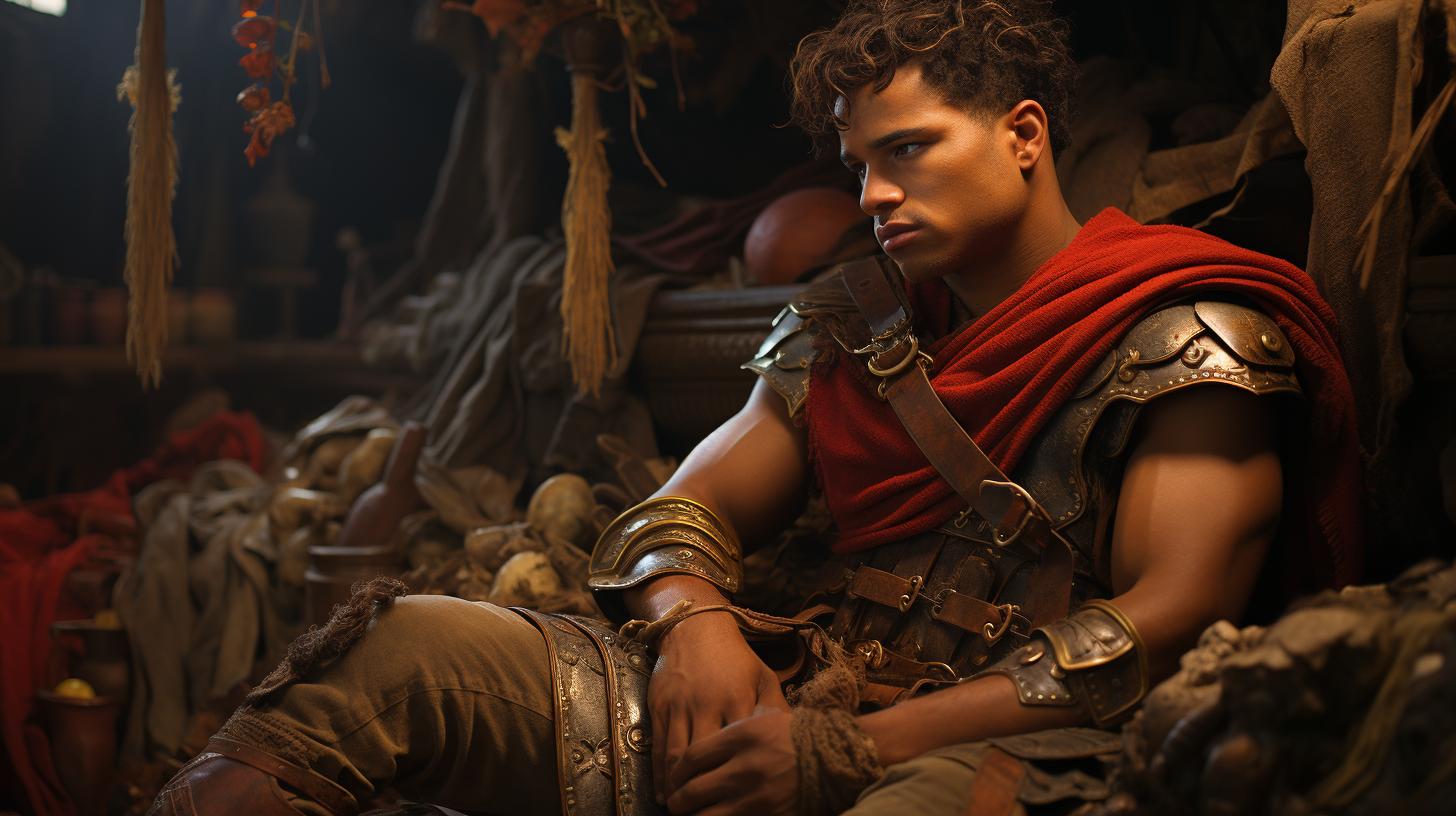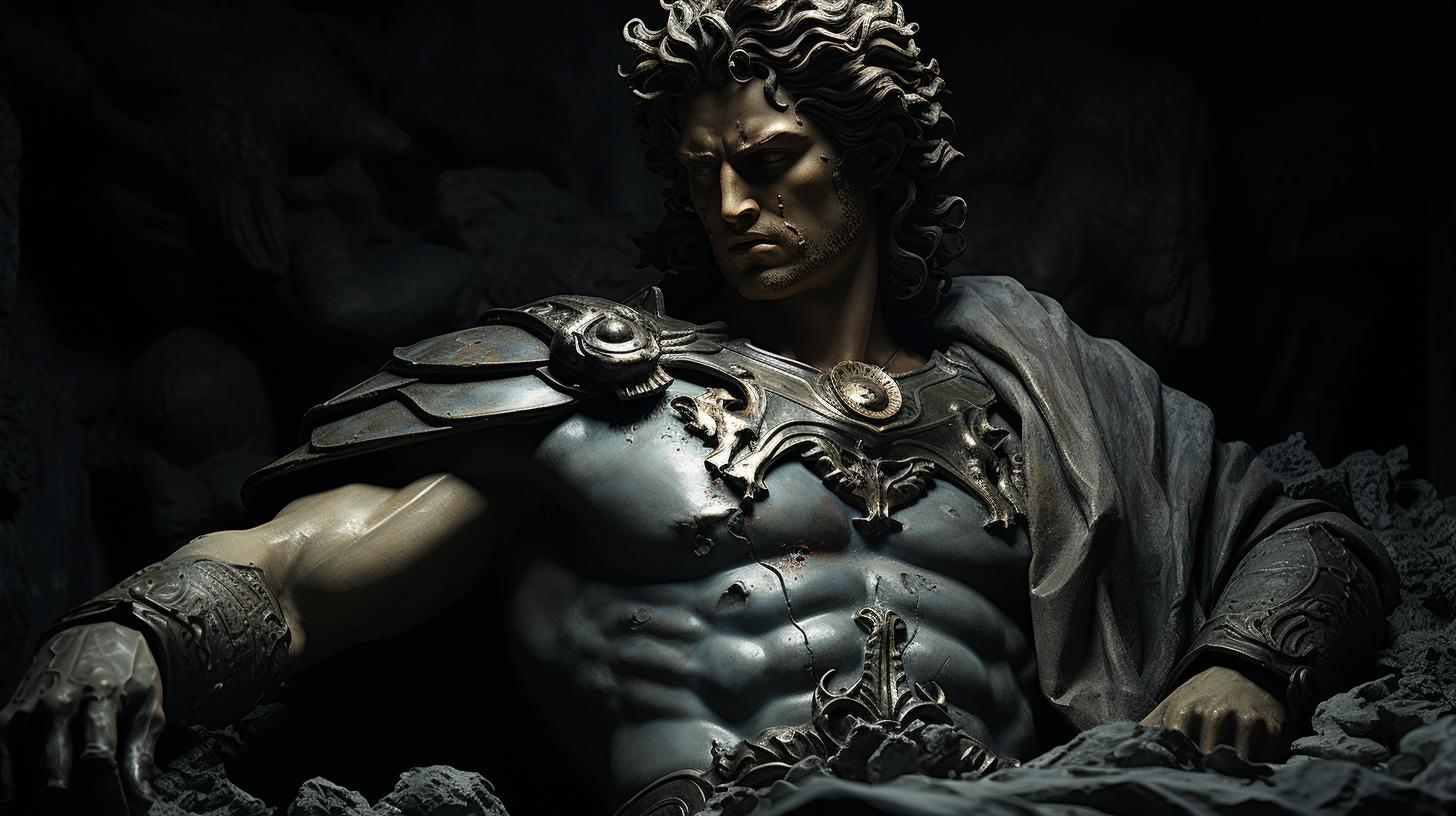Peitho Greek Mythology: The Persuasive Power of the Greek Goddess

Peitho, the Greek goddess of persuasion and eloquence, plays a significant role in Greek mythology. Associated closely with Aphrodite, Peitho is described as the mother of Erotes and often depicted in wedding preparations and love affairs.
She is also linked to other deities such as the Charites and participates in the creation of Pandora. Peitho’s cult, dating back to the 5th century BC, emphasizes her persuasive abilities and importance in new relationships.
Ancient texts mention her role in seduction and her impact on famous figures like Jason and Medea.
The Mythological Origins of Peitho
Peitho, the Greek goddess of persuasion and eloquence, has various accounts of her origins in mythology. According to Hesiod’s account, Peitho is believed to be the daughter of the Titans Tetis and Océano.
However, Sappho’s account states that she is the daughter of Aphrodite. Other sources suggest that Peitho is associated with Ate and Dionysus, being their daughter in Agamemnon and Dionysiaca, respectively.
Hesiod’s Account: Peitho, Daughter of Titans Tetis and Océano
In Hesiod’s Teogony, Peitho is described as the daughter of the Titans Tetis and Océano. This lineage connects her to the ancient and powerful Titan gods, emphasizing her divine nature and importance in Greek mythology.
Sappho’s Account: Peitho, Daughter of Aphrodite
Sappho, the renowned Greek poet, presents a different version of Peitho’s origins. In her account, Peitho is considered the daughter of Aphrodite, the goddess of love and beauty. This lineage highlights the close relationship between Peitho and Aphrodite and their shared influence in matters of persuasion and allure.
Other Sources: Peitho’s Associations with Ate and Dionysus
Apart from the aforementioned accounts, other sources mention alternative origins for Peitho. Some attribute her parentage to Ate, the goddess of mischief and deceit, while others suggest that she is the daughter of Dionysus, the god of wine and ecstasy.
These associations demonstrate Peitho’s diverse connections within Greek mythology, intertwining her power of persuasion with different realms of influence.
Peitho’s Relationship with Aphrodite
Peitho, the Greek goddess of persuasion, shares a close relationship with Aphrodite, the goddess of love. As a companion of Aphrodite, Peitho accompanies her and assists in various romantic endeavors.
Together, these two powerful goddesses symbolize the forces of persuasion and love.
Peitho as a Companion of Aphrodite
Peitho is often depicted as a constant companion and ally of Aphrodite. They are portrayed together in numerous mythological scenes, highlighting their inseparable bond. As Aphrodite’s trusted confidante, Peitho is present during important moments in the goddess’s life and intervenes to ensure the success of her plans.
The Mother of Erotes: Peitho’s Offspring with Aphrodite
A significant aspect of Peitho’s relationship with Aphrodite is her role as the mother of the Erotes, the children of Aphrodite. These mischievous and playful winged beings represent various aspects of love and desire.
The Erotes are often depicted carrying out Aphrodite’s bidding, spreading love and desire among mortals.
Peitho’s Involvement in Weddings and Love Affairs
Peitho’s connection to Aphrodite extends to her involvement in weddings and love affairs. She is often present during wedding preparations, ensuring the smooth progression of the union and showering the couple with her persuasive powers.
Peitho represents the art of seduction and persuasion, playing a crucial role in forging romantic relationships and nurturing the bonds of love.
In summary, Peitho’s close relationship with Aphrodite embodies the intricate interplay between persuasion and love.
As a trusted companion, Peitho assists Aphrodite in her romantic endeavors and is the mother of the mischievous Erotes. Her involvement in weddings and love affairs showcases her influential role in the realm of love and desire.
Peitho’s Connection to Other Deities
Peitho, the Greek goddess of persuasion and eloquence, has significant connections with other deities in Greek mythology. These connections highlight her role and influence in various aspects of Greek culture and belief.
Peitho’s Association with the Charites
Peitho is closely associated with the Charites, also known as the Graces. She is believed to be their daughter, having been born from the union of Dionysus and one of the Charites.
This connection emphasizes Peitho’s alignment with beauty, charm, and grace, as the Charites were known for their roles in enhancing these qualities.
Peitho’s Role in the Creation of Pandora
Peitho, along with the Charites and the Horai, played a significant role in the creation of Pandora, the first mortal woman.
It is said that they adorned Pandora with golden necklaces and crowned her with spring flowers, symbolizing the charms and allure that Peitho brought to the world. This association further emphasizes Peitho’s connection to beauty, seduction, and persuasive abilities.
Peitho’s Participation in the Seduction of Helen
Peitho is famously associated with the seduction of Helen, which ultimately led to the Trojan War. She is depicted alongside Aphrodite, representing the forces of persuasion and love in action.
Peitho’s presence in this narrative highlights her role in captivating hearts and influencing pivotal events in Greek mythology.
In conclusion, Peitho’s connection to other deities such as the Charites and her involvement in the creation of Pandora and the seduction of Helen underscore her importance in concepts of beauty, persuasion, and the power of allure.
These associations further illuminate the significant role Peitho played in Greek mythology and cultural beliefs surrounding love, charm, and eloquence.
The Cult of Peitho and its Significance
The cult of Peitho holds a rich historical background with deep roots in ancient Greek mythology. This section explores the historical context of Peitho’s cult, its worship practices, and its connection to the goddess Aphrodite. Additionally, it delves into the role of Peitho in marriage and new relationships.
Historical Background of Peitho’s Cult
The cult of Peitho has its origins dating back to ancient times, with its earliest records found in the 5th century BC. As a goddess associated with persuasion and eloquence, Peitho held a significant place in the religious practices of ancient Greeks.
Peitho’s Worship and Connection to Aphrodite
Peitho’s cult was closely intertwined with that of Aphrodite, the goddess of love and beauty. Both deities were celebrated together in various religious festivals and rituals, emphasizing the importance of persuasion and love in Greek society.
Devotees sought Peitho’s favor and guidance in matters of the heart, romantic relationships, and marital harmony.
Peitho’s Role in Marriage and New Relationships
Peitho played a pivotal role in the domain of marriage and new relationships. Her persuasive abilities were believed to assist in establishing successful unions and fostering love between partners. Alongside Zeus, Hera, Aphrodite, and Artemis, Peitho was revered by couples seeking blessings and guidance for their marital journeys.
- Peitho’s influence extended beyond the confines of marriage, as she was also regarded as a patron of new relationships.
- Her association with the creation of Pandora symbolizes her role in bestowing charm and allure upon individuals.
- Peitho’s ability to open the doors to true love showcases her significance in guiding individuals towards genuine and lasting connections.
The cult of Peitho played a vital role in Greek society, highlighting the importance of persuasion, love, and harmonious relationships.
Worshipers sought her favor to navigate the complexities of human interaction and to establish deep and meaningful emotional bonds.
Peitho in Ancient Texts and Interpretations
In ancient Greek texts, Peitho, the goddess of persuasion and eloquence, played a significant role in the realm of seduction and persuasion. She was revered as a powerful deity who influenced the hearts and minds of mortals.
Let us explore the various aspects of Peitho’s presence in ancient texts and her impact on famous figures and artistic representations.
Peitho’s Role in Seduction and Persuasion
Peitho’s association with seduction and persuasion is evident in many narratives. She possessed the ability to sway emotions and manipulate desires, oftentimes facilitating the fulfillment of forbidden love. Through her persuasive charm, Peitho enchanted both mortals and gods, leading them to succumb to her influence.
Peitho’s Influence on Famous Figures: Jason and Medea
One notable example of Peitho’s influence is seen in the story of Jason and Medea. It is said that Peitho played a pivotal role in assisting Jason in capturing Medea’s heart.
Through her persuasive powers, she paved the way for their epic love affair, which had far-reaching consequences.
Peitho’s Symbolism and Representation in Art and Literature
Peitho’s significance is not only limited to mythological texts but also extends to art and literature. In various artistic representations, she is depicted as a graceful figure intertwined with themes of persuasion, seduction, and the complexities of human relationships.
Her presence in literature serves as a reminder of the enduring power of persuasion in shaping human interactions.
As we delve into ancient texts and interpretations of Peitho’s role, we gain valuable insights into her influential presence in Greek mythology and the profound impact she had on seduction, persuasion, and the human experience.
.



















